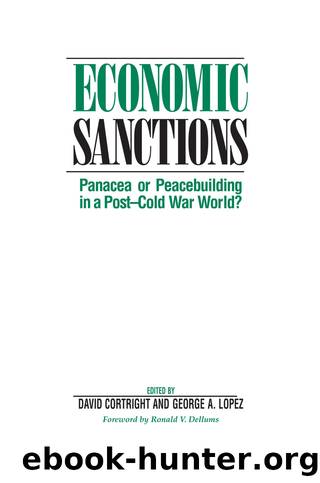Economic Sanctions by David Cortright & George A. Lopez

Author:David Cortright & George A. Lopez
Language: eng
Format: epub
Publisher: Taylor & Francis (CAM)
Ensuring a Just-Sanctions Regime
Acknowledging the moral dilemmas posed by sanctions, we have argued that comprehensive sanctions may be considered as an alternative to war in terms of their intent, the nature of the harm they cause, and their effectiveness, although limited, in resolving problems without recourse to force. This is not to suggest, however, that sanctions may be given blanket moral approval. Far from it. We would propose that a morally legitimate sanctions regime should clearly meet several criteria.
First, imposing sanctions should be a response to a grave injustice committed. Because a comprehensive sanctions regime is a blunt and potent instrument of coercion, it should be imposed only in response to aggression or grave and ongoing injustice. Fundamental international norms must be at stake to warrant resort to this level of coercion. The violation need not be as serious as that necessary to justify the use of military force, but it must meet a high threshold.
Second, parties imposing sanctions should have a commitment to and reasonable prospects for reaching a political settlement. We have argued that the moral legitimacy of a sanctions regime depends, in part, on whether it is used as an alternative to war. That, in turn, requires that it be intended and pursued as an alternative to war; that it has a reasonable prospect of achieving legitimate objectives, instrumental or symbolic; and that it does not cause the grave or irremediable harm of the kind caused by war. It is imperative that any sanctions regime be tied to an abiding commitment to and a feasible strategy for finding a political solution to the problem that justified the imposition of sanctions. As Vatican Secretary of State Cardinal Angelo Sodano has said, "Sanctionsâwhether in the former Yugoslavia, Haiti, or Iraqâmust also be accompanied by an international commitment to negotiations in order to be legitimate."26 Without the requisite political will and reasonable prospects for a political solution, sanctions lose much of their moral attractiveness. Sanctions then fail to serve as a tool of international diplomacy and become more like a war of attrition or an excuse for inaction or indifference. The requirement that sanctions be part of a feasible political strategy means that a sanctions regime should have clear and reasonable conditions set for their removal. If it becomes clear that existing sanctions have no reasonable prospect of achieving their objectives and are causing unacceptable harm, they should be lifted.
Third, sanctions should only be imposed when less coercive means have failed. The international community should impose sanctions only if less coercive measures have been tried or are not likely to succeed. If war is the last resort, comprehensive economic sanctions are the penultimate resort. Generally, therefore, sanctions should be pursued as an alternative to and before the use of military force. But sometimes, as in Somalia and Rwanda, the urgency of the situation and the likelihood that sanctions would not work could justify the limited use of military force without first applying economic sanctions. With respect to less coercive measures, this condition also places a twofold burden on the international community.
Download
This site does not store any files on its server. We only index and link to content provided by other sites. Please contact the content providers to delete copyright contents if any and email us, we'll remove relevant links or contents immediately.
| Accounting | Economics |
| Exports & Imports | Foreign Exchange |
| Global Marketing | Globalization |
| Islamic Banking & Finance |
The Meaning of the Library by unknow(2565)
Six Billion Shoppers by Porter Erisman(2296)
Why Nations Fail: The Origins of Power, Prosperity, and Poverty by Daron Acemoglu & James Robinson(2288)
No Time to Say Goodbye(2113)
Red Notice by Bill Browder(2070)
The Economist [T6, 22 Thg9 2017] by The Economist(1924)
Currency Trading For Dummies by Brian Dolan(1921)
Thank You for Being Late by Thomas L. Friedman(1766)
Bitcoin: The Ultimate Guide to the World of Bitcoin, Bitcoin Mining, Bitcoin Investing, Blockchain Technology, Cryptocurrency (2nd Edition) by Ikuya Takashima(1694)
Amazon FBA: Amazon FBA Blackbook: Everything You Need To Know to Start Your Amazon Business Empire (Amazon Empire, FBA Mastery) by John Fisher(1559)
Coffee: From Bean to Barista by Robert W. Thurston(1542)
The Future Is Asian by Parag Khanna(1480)
The Great Economists by Linda Yueh(1453)
How Money Got Free: Bitcoin and the Fight for the Future of Finance by Brian Patrick Eha(1423)
Grave New World by Stephen D. King(1418)
Pocket World in Figures 2018 by The Economist(1414)
Capitalism Without Capital: The Rise of the Intangible Economy by Jonathan Haskel(1398)
The Sex Business by Economist(1382)
Cultural Intelligence by David C. Thomas(1286)
